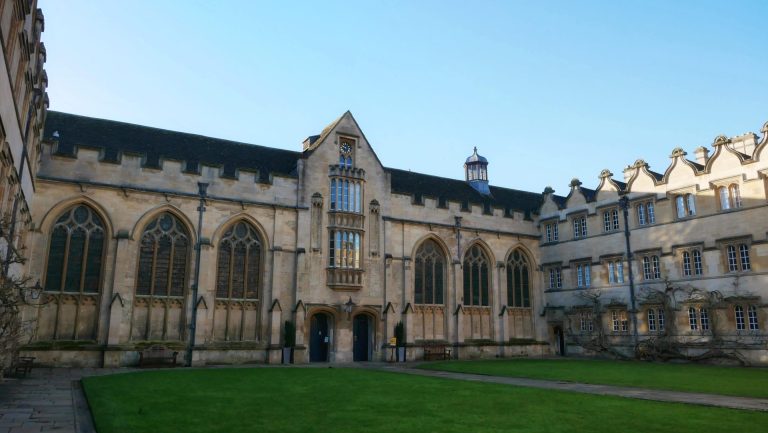Alex O’Connor has been doing all he can to help the philosophical fly out of the fly bottle. Now a philosophy social media star at 26, he’s been an out-and-proud atheist, vegan, free speech advocate, and more.
He started his YouTube channel at the age of 17 under the name “Cosmicskeptic” and it’s since racked up 1.4 million subs. His podcast Within Reason has seen everything from scholars dissecting Biblical hermeneutics to Penn Badgley telling him about what it was like to star on the Netflix show You. These combined efforts have landed him in the same circles as Richard Dawkins, Jordan Peterson, Sam Harris and the like. He’s also a Philosophy & Theology alumnus of St John’s College Oxford.
Cherwell sat down with him in Covent Garden to discuss a range of topics over (soya) lattes, from his Oxford experience to his thoughts on Christianity.
Cherwell: Were you well-behaved as a student?
O’Connor: No, not at all. Once I realised that lectures are technically non-compulsory for a humanities course, I stopped going. I think I went to maybe a handful of lectures near the beginning, and then I stopped. And then near the actual exam time, I started watching some of the online lectures. But no, I didn’t do any of the reading for the tutorials.
Cherwell: Then how did you get through them?
O’Connor: Well, most of the time I didn’t. Sometimes I did, sometimes I didn’t. Like, it’s not like I was always totally bad. But I definitely did the minimum amount of reading. Which wasn’t great. I wouldn’t recommend it.
Cherwell: So what did you spend your time doing?
O’Connor: Going to the pub. Sleeping. Hanging out with friends. Trying to live the Oxford life. But also, yeah, making YouTube videos.
And when I had an important deadline, when I really knew I needed to learn something, I would do it. But I was always acutely aware of the fact that the only thing that mattered was the exams. Anything I didn’t think would be needed for the exams, I didn’t prioritise. My worst module was General Philosophy in first year. Amir Srinivasan was teaching us, who later became this feminist superstar—she wrote The Right to Sex—and we just happened to have her in first year. And I completely wasted the opportunity. For that particular paper, I just had a lot on. I remember being in her tutorial having not done the reading, and I regret that.
I enjoy learning about things, but I’ve never gotten on with, like, academic environments very well. Certainly, back in like secondary school, no way. I wanted to be a skateboarder or guitarist. The first time I did my A-levels I failed them and had to retake them, because I just wasn’t going to class. And there were meetings about it, with parents coming to it. I overslept one of my exams. It was at 1pm and I overslept it. It’s the level of disrespect that I had.
The thing is, if I’d have done well the first time, I would have done Maths and Further Maths. I would have gone onto do something science-y, and it would have been a different career path. I think I was just in the wrong line, you know?
At Oxford, I would occasionally just not do collections. I’m pretty sure that once I sent an email being like, “Look, I’m just not going to do this. I don’t want to do it, I know you don’t want to mark it, I wouldn’t answer this question if it came up on the exam, so I just don’t think it’s worth my time right now.” And I think as long as you can demonstrate to your tutors that you genuinely think that, and you’re not just taking the piss, depending on who the tutor is, they might be okay with it.
I came out with a 2:1, which is great, but I definitely could have got a first if I’d studied. Especially in the degree that I did, Philosophy and Theology, given the line of work that I was already in, I felt like I could get away with a lot. But that was wrong. I mean, you’ll be doing a philosophy of religion paper, and you do a week on the problem of evil, and it’s like, “Okay, I reckon I’ll be alright here”. But you’re still not going to know the papers that they specifically want you to read, and you’re still not going to know the angle that they want you to take.
And so I never had the feeling of being like, “I don’t need to do this.” But I guess I just didn’t feel the excitement of it. I don’t mean to say that I was sat there thinking, “Oh, I already know about all of this.” It was like, “I kind of don’t care to learn about this because I’ve talked about the problem of evil over and over again.”
Cherwell: Favourite places in Oxford and why?
O’Connor: One of the places I’m most often found is the Queen’s Lane Coffee House. Honestly, I’m not entirely sure why. I think it’s probably because of the exterior and that they have seating outdoors, which is kind of a rarity at Oxford, or at least it was when I was there. I can’t really think of anywhere else that does European-style outdoor roadside seating. It’s a shame that all the buses run up and down because it’s a beautiful street, and I think it’s ruined, as most cities are, by the presence of the automobile. But it’s a beautiful spot.
You go there enough, and you do start to get a little bit sick of the music. They play the same classical renditions of pop songs over and over again, which is fine. It’s nice. It’s actually quite suitable for the environment, but when you start realising that they’re playing it on repeat, it can drive you a bit insane. But I’m there all the time. Outside of that, I’m a pub-goer, of course, and I tend to either be at the Lamb and Flag, I used to love the Eagle and Child, or The King’s Arms for a time was one of my favorites. But my fondest memories are of the Half Moon, just because it’s open late, and so it’s usually the place where we would end up at the end of the night. Some of my most tipsy and jovial memories just happened to be in that pub. I don’t know if it’s the pub itself, but I quite liked the vibe. I’ve got a bit of Irish in me.
Cherwell: I’ve always wondered if you were Irish since your surname is O’Connor.
O’Connor: Yeah, I’m Irish on my dad’s side. It’s not a massively interesting fact about me just because I don’t have any real connection to Ireland. I’ve been a couple of times. I don’t really identify with it in any respect, but that’s where I get the surname from, so maybe it’s that that draws me to the Half Moon. But being in Oxford in general is really nice. Punting as well. Honestly, one of my favourite places is Magdalen College. Being in and around Magdalen College, either on a punt or walking around Addison’s Walk. It’s just a beautiful environment. So it’s probably my favourite place to be.
Cherwell: Opinions on the Oxford clubbing scene? Favourite night out?
O’Connor: In a way, ATIK shutting down is a travesty, but I think it will be quite quickly forgotten. It was quite iconic, but Oxford already had a reputation for not having a very good night scene at all. But I think because of that, people felt very at home with it. It wasn’t very intimidating. You would just sort of show up and have a good time. I don’t miss it. I much prefer to spend the time in the pub, but the thing is, if I spent enough time in the pub, then I would usually be drunk enough to be up for the idea of going to the club. And okay—real throwback, Purple Turtle. Purple Turtle was a club next door to the Oxford Union, now occupied, I believe, by Plush. It was my favourite club in Oxford.
There also used to be a lot of music venues that shut down. There was a place called The Cellar, which, again, was next door to Purple Turtle. I used to play there when I was like 16 or 17, and friends of mine couldn’t come to see the show because it was also a club. And there was just not much in the way of checking our age, because we were performing. So it was a really weird little environment. I do kind of miss that. Purple Turtle and The Cellar were big venues, but these days, they’re both gone. ATIK was big. Bridge, I always think is kind of the same thing. All just good times. I think there was something charming about it – the fact that it was a bit shit.
Plush used to be somewhere else, where the jam factory is by the train station, before it moved to where Purple Turtle was. But the thing is, Plush was a good club and Purple Turtle was a good club, but Plush in Purple Turtle just didn’t really feel quite right. It grew on me over time. I think I was just being sentimental about it. I wouldn’t go back these days; I’m not against the idea of going to a club, but in a student city it’s strange. The older you get, the more people begin to resemble 12-year-olds. It’s kind of uncanny. Because being in somewhere like London, if you go out for, like, most of the people that are out are slightly older and they’re in their 20s maybe 30s as well, yeah, and you kind of forget that you can go out to places like this when you’re 18. But if I could go back in time and be 18 myself again and go back to those clubs, I would do it for nostalgia’s sake.
Cherwell: Aside from co-founding Socratic Society, what and extracurriculars were you involved in at Oxford?
O’Connor: Yeah, there was the Socratic society. Outside of that, I dipped in and out. I sometimes went to the chess club. I went to Poker Society quite a lot. When I was there, there was a real poker scene at Oxford. The guys who were running it were real no-bullshit type people who could settle disputes and had it all under control. And that’s where I first met Malala. It was one of those moments where you’re like, “Man, I’m really doing this Oxford thing.” I went to introduce myself to the person who sat down next to me. I said, “Hi, I’m Alex.” And I saw that it was Malala, so I like knocked my chips over. And I’m pretty sure she never said her name back. I think I took a lot of money off her in the game, enough money off her to pay me back for her memoir which I bought.
As far as I know, she’s still a Muslim. The thing is, I was never sure if I could tell people that I played poker with Malala, since I didn’t want to “out” her or anything. But then one time I saw an interview where she mentioned playing poker at uni. And I thought now I can tell this story. Everybody at Oxford at that time had a Malala story. Emma Watson’s the one now.
Cherwell: Give us an Oxford hot take.
O’Connor: Oh, maybe a hot take is I think Christ Church is a bit shit. Not the people, I just mean I don’t like it as an environment.
Cherwell: In a recent Q&A video you were asked what makes a good interviewer. To flip that around, what makes a good interviewee?
O’Connor: I think enthusiasm is something people really appreciate, and demonstrating a willingness to indulge in rabbit holes. And also , being friendly. The best interviews I’ve ever done have been with my friends, not because they’re the most famous or well-established guests, but just because there’s a good rapport. Also, just say when you don’t know something. It’s just not worth the embarrassment.
The number one comment that I see on interviews is something like, “I can really see that this person’s passionate”. There’s something really nice about just giving someone space to talk about something they care about. Sometimes I feel like people write books for the sake of writing books. It feels they don’t really want to be doing this interview or being on that press tour. Don’t be that person.
Cherwell: When you’re in the middle of a debate it can be hard to realise you’re wrong. How do you get better at acknowledging good rebuttals to your position, especially in the moment they’re made?
O’Connor: It depends on the nature of the point, because if the point would undermine your entire worldview, that’s not something you should just say there and then, because there might be things you haven’t considered. I think you just have to say, “That’s a good point. I’ll think about that.”
The best thing you can do is, prior to that occurring, have an attitude and orientation to conversations and debate where people are aware that you are not arrogantly entrenched—so that if someone comes along and makes a good point, you can just say so.
I just did a debate a couple of weeks ago and there was one section where I was talking about whether Christians should think that Jesus is the angel of Yahweh in the book of Exodus. And I was talking about something in the book of Hebrews, which indicated to me that they shouldn’t think that. And someone in the Q&A got up and said, “Well, what about in Hebrews 11, where it implies that Moses met Jesus?” And I was like, “Well, I think Hebrews has a high Christology. I’m still not sure if that makes him the angel of Yahweh, but that’s a good point.” And that was it.
It’s frustrating because a lot of Christians have been clipping it, and making these videos about how I’ve been skewered by this question—and I get it, because he asks a question and I admit it’s a good point. But a lot of people, even on those videos, are saying, “Well, it’s really nice of you to say that.”
You can also have a sense of irony about it. Whenever I’m debating with friends, there’s almost a bit of silliness, like we’re playing, such that I can die on a hill and if somebody then says something that undermines it all, I just sort of go like, “Yeah, okay, fair point”, because we haven’t placed too much stock in it. In public debates, it’s a bit different, obviously. But I’m kind of over doing debates. Like, they just suck. They’re theatre, and they’re entertaining, but I just don’t think it’s worth the confusion that this represents the extent of somebody’s views and ability to communicate themselves. It’s more about recall and wit. That’s not an original point to make, but I’m really beginning to feel it. Especially as my audience gets bigger, there’s way more in the way of back and forth in the comments about how this person’s an idiot or whatever. When I do a podcast, that just doesn’t happen. We have a conversation.
You can go into a debate thinking, “I’m right about this, and I’ve got something to prove here,” and that’s fine, but then if somebody makes a good point, prepare to be embarrassed. If you come in with a bit more humility, you might still be embarrassed. But it doesn’t have the same feeling as “that guy really needs a smack in the face.” It’s like the difference between a boxer giving up all the talk and then getting knocked out versus a boxer who says, “Hey, this will be fun. Let’s find out who’s the better fighter. Good luck,” and then gets knocked out. It’s still a bit embarrassing, but not in the same way.
Recognise that if you’re going to have a career in public speaking or you’re going to have debates with your friends, if you have one debate every month for the rest of your life, it is guaranteed that at least one time you will be wrong. So, you just have to be prepared every time you have a debate for that to be today.
Cherwell: Can you give us some book recs?
O’Connor: I always recommend people The Screwtape Letters, because I think Lewis just nails the vibe of being an atheist, having been an atheist himself. Oh, and Essays in Love by Alain de Botton. It’s phenomenal.
Cherwell: It must be pretty cool knowing that you have the power of enabling people to make purchases just by recommending a book.
O’Connor: Yeah, especially when I have an affiliate link (joking). I do have affiliate links, but I don’t push them. I’m a bit stupid, really, because people are always asking for book recommendations, and I reckon I could make money off that.
I’m pretty selective, not just about which companies but also exactly how I promote them. I think I do it with a sense of irony. I’m aware that I’m doing an ad-read. With some podcasters, you see the sincerity with which they deliver the ad-read and you don’t believe them, and then you watch them interviewing the person and suddenly you don’t believe them there either, because it’s the same energy.
Cherwell: You’ve said your opinions on religion have changed since studying Philosophy and Theology as a degree. It seems like you’ve become more moderate. What are a few examples of considerations that have prompted you to change your stance?
O’Connor: It’s kind of a vibe shift, as opposed to an argument. Firstly, the idea that the New Testament in particular goes way deeper than I thought. It’s just so fascinating. The first thing that happened was I got interested. I really became more overwhelmed with the feeling of confusion as to why this text exists. Because you can say somebody made this up and wrote it down, but when you actually look at a manuscript, you have to wonder why did somebody sit down and write out this whole narrative? And then, why did three other people do the same thing? And why did many other people do the same thing, albeit in ways that seem less authentic? Paul existed, and he was writing letters to churches. He had some experience. Something happened. Why? You can’t just say, “they’re all just a bunch of illiterate Iron Age peasants.” People say that all the time, but that only makes it more of a miracle if they were illiterate and they managed to put the book together.
I think it’s got something to do with the fact that there are four Gospels. There’s a lot of cross-examination that you can do, and it’s so fascinating. And through that interest, I realized that it’s deeper than I thought. In my very earliest days, it was like real Reddit-tier stuff like, “How many women discover the tomb? One Gospel says it’s one woman, another says two.” And it’s just ridiculous to think that that means anything. So there’s that. And then also realizing the God that the New Atheists imagine is not real to anybody.
Cherwell: Isn’t the point that the God that they imagine is the logical extension of what’s written in the Bible?
O’Connor: That’s what they think. And I still agree with them about the God who’s present in the Old Testament scriptures. Which is why I’m in an odd spot of being really besotted with Jesus of Nazareth as a person, and being absolutely fascinated by who he historically was and why he had such an effect on the world. But it’s connected to this religious tradition which I think presents a very different kind of God to the God that is believed in by creedal Christians. I don’t believe that Jesus claimed to be God. I’m not even sure about the status of God in the Old Testament. I just did a podcast about monotheism in the Old Testament and whether it’s really present there. There are lots of indications that older pictures of divine pantheons found their way into the Old Testament, most famously in the use of plurals. God in Genesis says, “Let us make man in our own image, according to our likeness.” Obviously Christians would say it’s because it’s the Trinity. I’m looking at this historically, wondering what the authors thought. I don’t think that’s what they had in mind, because the Trinity doesn’t develop as a doctrine until even hundreds of years later. So, it’s a little bit weird. And I understand the New Atheists looking at the Old Testament and going, “this is an evil God”, but they say the same thing about Jesus. And I think it’s a bit shallow. Richard Dawkins still says that the New Testament is evil because of the idea that we all need to be saved. I’m not sure that he’s reflected on the extent to which there is some truth in that.
What I’ve realized is that a lot of the problems that I’ve had with Christianity, the evils of the Old Testament, the contradictions in the New Testament texts, can be resolved not by saying Christianity is false, but rather by saying Christians today have the wrong set of texts, or have the wrong interpretation of the texts. Maybe the Old Testament evil God is best explained by a Gnostic cosmology that says that Jesus is God, but Yahweh is not. Maybe the contradictions in the Gospels are best explained by the fact that certain troublesome passages were added in later. Maybe some of the weird things Jesus said or did were explained by the fact that he never actually said or did them. And so, if I meet a Christian who believes all of those things, I can still say I think they’re wrong. But if you ask me whether I personally read these texts and go, “Is it all bullshit?” I have no idea. I don’t know.
Cherwell: Have your views changed on the arguments for God’s existence?
O’Connor: I find it really difficult to talk about God’s existence as I reflected more on what God would be if he did exist. I think there are some really powerful considerations to suggest that something must sustain being. But I’m also aware of the fact that I don’t think we’d be capable of comprehending the nature of that thing. If it existed, we’d all essentially be participating in it.
I don’t think that there’s conclusive proof of God’s existence, at least not to the extent that I’ve been convinced by it. But I don’t, from that, rule out the idea that there could be such an argument, and certainly not that there is a God. People often look for escape hatches with these arguments. They say, “You’ve proven the first cause, but that cause doesn’t have to be God.” Okay, yeah, that’s true. “Oh, you’ve proven God, but it might not be a good God.” Okay, fine. But if you put all of those considerations together—if, say, you get a Matt Dillahunty type who will take each individual argument and poke a hole in it—at some point you can say, “Okay, we’ve only proved a first cause. Can we just agree that this argument is reasonable?” Maybe, maybe he’s still got an issue with it. But if you’ve got that argument and this argument and that argument, and they’ve all got little holes in them, but if you put them together, they plug up each other’s holes and they present this unified picture, I think it’s very powerful. As an atheist, I think you have to deal with that bigger picture.
Cherwell: Would you describe yourself as an introvert or an extrovert?
O’Connor: Well, what is it they say, that it depends on where you get your energy from? I feel like I do better on my own in that respect. I need to regenerate on my own. I’m not energized by social environments. They drain me, but I enjoy them. So on that definition, I suppose I’d be an introvert. And also, if I go to a party and I don’t know anyone there, I’m not the kind of person that can easily go around and talk to people. However, if I bump into somebody and they say they’re a Christian, sometimes you ask a follow-up question, and then get into a conversation, and I could talk to them all night and I suddenly become extroverted. Sometimes I can talk for hours and hours and hours. That’s because we’ve got something to talk about.
Cherwell: I think you’re quite an interesting case because there’s this weird idea some people have that really intelligent people must be introverts. But you talk for so long on these podcasts and you have all this confidence, and people associate that with extraversion. So you fit these two stereotypes that counter each other.
O’Connor: I genuinely just don’t think that I’m extremely intelligent. I think I’m good at explaining things, and I’m intelligent when it comes to putting words together. I don’t downplay what I think I’m good at. I’m really good at understanding why somebody isn’t understanding something and picking up on exactly where somethings going wrong. But the kind of intelligence required to really make academic contributions–your Wittgensteins, your Russells—I’ve never really been in a situation where I’ve been able to see if I could do something like that, but I highly doubt it. I think I’m good at a relatively limited set of things, and I try to stick to those things.
If it weren’t for being a YouTuber, I’d probably be an introvert. I’d have my friends, I would talk to them, and that would be that. I just feel like a bit of an extrovert because I spend so much time talking confidently to people who I don’t know.
Cherwell: I think you must have very interesting inner monologue, mostly because you have an interesting outer monologue.
O’Connor: A lot of my sort of inner monologue is putting ideas together. I think that’s quite fun. I think I must be an introvert. I’m kind of suspicious of the dichotomy anyway, but it makes sense. There’s obviously a spectrum of people, and I probably basically sit in the middle of it. But definitely my energy comes from being alone. But I don’t like being alone. If it’s 7pm and I’m at home alone, I kind of just feel like something’s wrong. I feel like I need to be out somewhere. So maybe that’s slightly extroverted—I don’t know, it’s not up to me to decide. You’d have to ask my friends.











